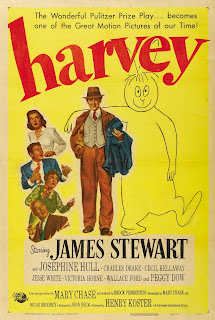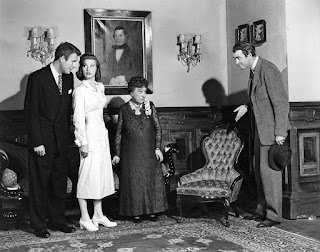Harvey (1950)
Director: Henry Koster
Starring: James Stewart, Josephine Hull
Honors:
Academy Award for Best Supporting Actress
#35 on AFI’s 100 Laughs
#7 on AFI Top Fantasies
Jimmy Stewart’s ability to make audiences believe he converses
with a large rabbit we can neither see nor hear is the basis of this all-time comedy
favorite. This adaption of a successful Broadway production was a passion
project of Stewart’s in his return to prominence within Hollywood, earning
himself Oscar and Golden Globe nominations along the way. A simple production,
the film’s effectiveness comes from Stewart’s performance and a few modest
effects in a story about a man that appears to have issues, but truly wants to support
others, transforming a silly premise into a heartwarming tale.
Harvey is a comedy about a kindhearted man whose best
friend is an invisible man-sized rabbit and the people attempting to have him
committed to a psychiatric hospital. Elwood P. Dowd (James Stewart) is an all-around
good-natured, middle-aged man with a kind heart and warm soul, only he has a
tendency of milling around the local tavern most days and an inclination to
introduce people he meets to his best friend, a six foot three-and-a-half-inch
invisible rabbit he calls Harvey. These regular actions of Elwood trouble his
jittery socialite sister Veta (Josephine Hull) who arranges for him to be
committed to a sanatorium. The exasperated nature of Veta plays into the
comedy as attending staff question who between Elwood and Veta is to be
committed. Hospital staff and family pursue an unbeknownst Elwood, only to be
torn about committing an individual who even though shares ideas of an
imaginary friend is such a sympathetic individual with a kind ear, a warm
heart, and a willingness to aid people in need. Some, in time, even admit being
able to see Harvey as a real and helpful being, a reward of Elwood’s infectious
kindness. In the end they all decide
that the world is better off with more Elwood’s and less cynical realists as he
is allowed to depart the asylum with signs of the invisible Harvey at his side.
With a story that makes light of alcoholism, psychiatric
issues, and the how mental hospital staffs observe at and handle patients the
film is actually focused on individuals, their relationships with each other,
and the value of one’s character. Harvey is a lighthearted comedy that
does not take its situations very seriously as all its characters go about
earnestly while Elwood in his own way provides a wink and a node to how silly
it all is. The film sends a message about the value of one’s heart over one’s
mind as it shares a story of a man and his unseen giant rabbit friend. Stewart’s
character is so likeable that we would never deem him insane. In contrast Hull is
so erratic yet harmless that we can love her even though she tries so hard to
rid herself of the humiliation of Elwood’s actions. It is a sweet picture with
good fun. Regardless of whether if Harvey is real or not in the end the story makes
us feel warm about its message packaged with plenty of laughs along the way.
From the time Jimmy Stewart filled in on Broadway for the
vacationing Frank Fay as Elwood P. Dowd for the successful run of “Harvey” he
dreamt of reprising the role for a Hollywood adaption. Broadway critics were
mixed on Stewart’s depiction of Elwood, but his performance was such an
attraction reprised the role for a second time for Fay, further connecting Stewart
with Harvey. His stage experience aided Stewart in regaining confidence
after a series of Hollywood finical flops, despite many of those flops becoming
classics decades later. When Universal approached Stewart for a contract he
insisted one of his pictures being Harvey, putting the wheels in motion
for the cinematic adaptation
Along with Stewart Josephine Hull was brought aboard the
project to reprise the role of the Veta. Just as she did with Arsenic and
Old Lace Hull recreate another Broadway performance for Hollywood to
deliver the same energy that made the stage production so successful. The
stout, lovable, veteran actress provides the very opposite of the calm and
collected Elwood characters as the high-strung older sister Veta Louis Dowd
Simmons, ever embarrassed by her brother’s claims. The whole movie revolves
around the relationship of Veta and Elwood, making it even more important to
have these two stars of the Broadway production reprise the roles, which they
did so well they were both nominated for Academy Awards with Hull taking home
not just the Oscar, but that year’s Golden Globe as well for the supporting
actress.
The primary plot is fleshed out with B-story which contains a
sort of will-they, won’t-they relationship between sanatorium staffers Dr.
Sanderson, the attending psychiatrist, as his head nurse Miss Kelly, portrayed
by Charles Drake and Peggy Dow respectfully. It makes for an entertaining side
story as the all too attractive nurse Kelly with her starry eyes gaze for the
all too work focused Sanderson waits for the doctor to notice her growing yearning
and take the next step and make their relationship romantic. Drake’s
performance is as good a B-movie leading man while Dow’s performance does make
us believe she can still be in love with a man that easily overlooks her so
often. It is this relationship that is helped by Elwood, further cementing his
kind, helpful nature as they attempt to commit him to their facility, making
them question their own actions through the process while taking a closer look
at each other.
Character actor Cecil Kellaway is featured in the film as
Dr. William Chumley, owner and head psychiatrist of the sanatorium which bears
his name. It is through his performance which we realize that Harvey is not an
imaginary being at all as he admits to seeing the giant rabbit, the kind being
that Elwood has been talking about and introducing everyone too all along. For
the well-traveled character actor Kellaway brings his British styling, being of
South African heritage, to the role as a straight man with dignity, but cannot
help in embracing our hero and his unseen friend with open arms by the end of
the picture.
The production quality is meager with nothing elaborate and
when the picture is put into perspective it is easy to observe its stage production
roots. Like the play the complete awareness of Harvey as a character is fully
reliant on the performance of Stewart acting as if there is this invisible
character occupying the space he shares. It is not until the end of the picture
we get a handful of simple prop movements that reveals the existence of this of
the pooka (a mischievous being of Celtic origins) can physically manipulate the
world.
As a film Harvey was not an attraction of great
appeal for general audiences of the day. There were those familiar to the
Broadway production, but those would be few and mainly based near Broadway or
in show business. For many familiar to both, including critics, they had
trouble comparing the film and Stewart’s performance to the play and Fay’s
portrayal. Most film critics generally liked the picture and Stewart’s
wholesome take on Elwood, but saw not greatness in the film. The box office
returns manifest a general success, but a lack of massive appeal with this comedy,
but Stewart with his contract structured to benefit from profits ended up making
more money that what the studio would regularly pay a starring actor. Therefore
we can observe how low the studio believed in the picture and Stewart’s faith
paying off handsomely.
Harvey was not initially the well-loved picture it
would come with time. The film found its audience years later in television
airings, rising to become the all-time comedy classic of American cinema we see
it today. Fondness for Harvey continues to peak its head out in small
tributes and inspirations throughout Hollywood as the quintessential motion
picture featuring a theme of an invisible friend.
Overall fondness to Harvey through the years led the film being listed on several all-time favorite lists for comedies and among the many great pictures remembered in the career of Jimmy Stewart. It is still worth a watch every once and a while with the wonderful performance of Stewart and co-star Josephine Hull. It is a feel-good movie that continues to warm the hearts of those that watch this silly comedy about a man and his giant invisible rabbit friend.







.jpg)
Comments
Post a Comment